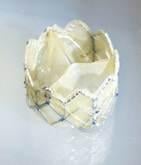
February 3, 2012 — Colibri Heart Valve received an notification it received patents for a new transcatheter heart valve from the United States Patent and Trademark Office. The office sent noyice it is granting granting U.S. Patent No. 8,109,995 for "Percutaneously Implantable Replacement Heart Valve Device And Method Of Making Same." The patent will issue on Feb. 7, 2012 and is directed to a method of making a percutaneously implantable replacement transcatheter aortic heart valve using a folding technique covering both bovine and porcine pericardium. The associated patent application (12/228,192) has priority claims with content dating back to Jan. 4, 2002. It is expected that the patent will provide Colibri with broad protection to prevent others from producing or distributing valves based on this folding technique through Jan. 4, 2022.
"We believe that replacement heart valves that use the unique folded tissue design will have meaningful benefits over currently available valves, including a reduced profile and increased resistance to wear," said Joseph B. Horn, Colibri’s president and CEO. "With this IP in place, and with additional patents pending directed to a pre-packaged, sterilized, percutaneous heart valve delivered through a 14 French sheath, we believe Colibri is well positioned to initiate first-in-human clinical trials with the Colibri valve later this year."
Colibri recently completed a $5 million Series B financing by a consortium of angel and high net-worth private investors. This capital will be used to commence a first-in-human clinical trial of the Colibri valve replacement system in patients with a symptomatic stenotic aortic valve who are candidates for transcatheter aortic heart valve implantation (TAVI). This study will seek to enroll five to 10 patients in pre-identified centers in Western Europe.
About the Colibri Valve Replacement System for TAVI
TAVI has become an important treatment option in the United States for heart valve replacement due to its minimally invasive nature, clinical efficacy, extensive patient experience as an approved procedure in the United States and Europe, and reduced procedural costs. Colibri’s heart valve device incorporates advantages not in other available valves or those in known development. These advantages come through unique features including a significant profile reduction compared to other available devices, a folded valve construct using minimal sutures, thin and durable low-profile tissue leaflets, a dry valve which is pre-mounted at manufacture and pre-packaged with the valve fully integrated in its delivery system. The proprietary double balloon technology allows stabilized valve deployment and adjustment capabilities for accurate valve placement. Colibri’s proprietary tissue preparation process makes the Colibri replacement heart valve highly biocompatible and resistant to calcification.
For more information: www.colibrihv.com


 December 24, 2025
December 24, 2025 









